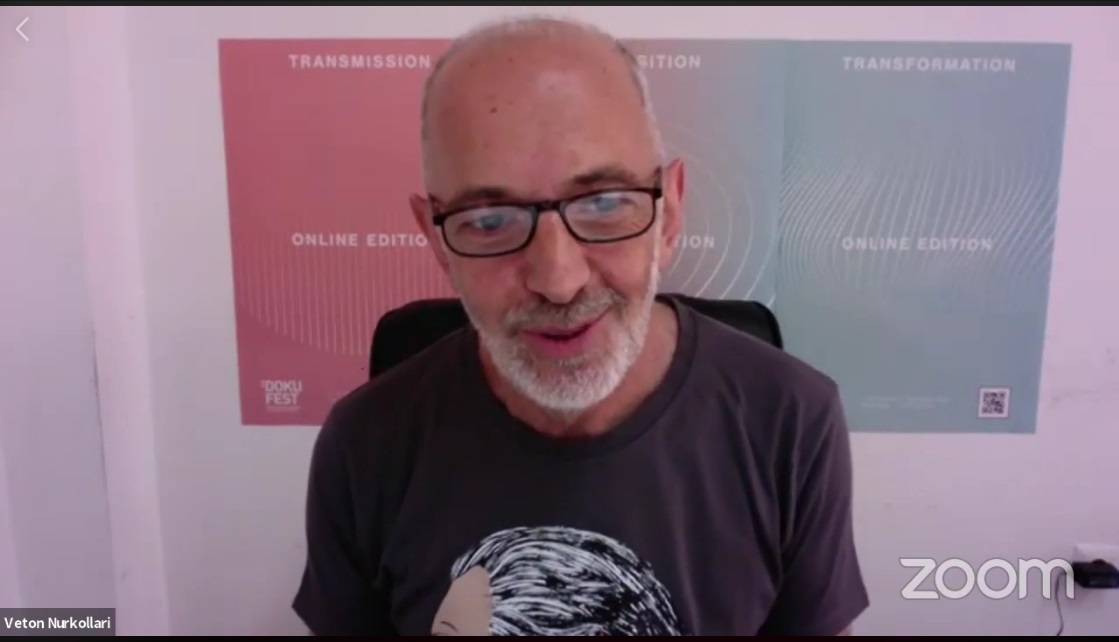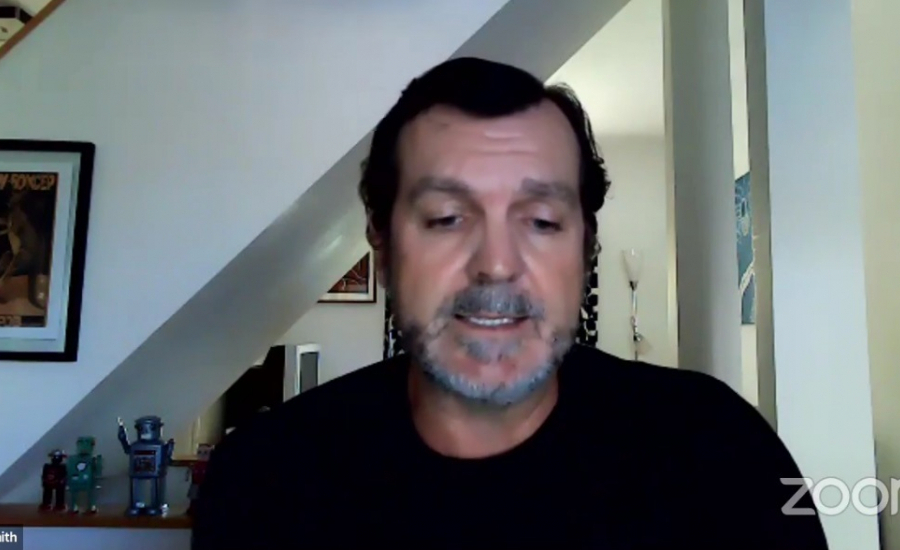19/08/2020
Moderated by Pamela Cohn, Orwa Nyrabia (IDFA), Cíntia Gil (Sheffield Doc/Fest), Veton Nurkollari (DokuFest), Shane Smith (Hot Docs) and Emilie Bujès (Visions du Réel) discussed the challenges and opportunities of shifting festivals to a virtual sphere. The choice of representatives from different film festivals was no coincidence as it allowed us to see the perspective of the virtual sphere from different angles, as the above mentioned festivals match various working schedules.
Since the beginning of the pandemic, Pamela Cohn introduces, it was clear that the decision had to be made very quickly due to travel restrictions, knowing that the work to prepare a festival begins one year before the official dates. Emilie Bujès and Shane Smith share their experience first since they were among the firsts to be concerned by the shifting to the online world.
To Emilie and Visions du Réel team, instead of canceling following the example of many festivals that also took place in March, the first idea was to get in touch with people in the audience and filmmakers to see the feedback they would receive for going online. The deadline being tight, only five weeks to change the whole preparation done at that point, the first urgency was to find a platform that could work efficiently. As soon as it was understood that going online was possible, the next step was to think further and grow up in several directions. The main priority always remained the audience, and the focus was to create the most user-friendly platform for it to serve all generations. Thus, communication was very important, therefore strategies had to be put in place to invite as many people to watch films and possible, and assist them with help if needed. Of course, there were some difficulties, especially concerning the lack of realism in doing too much. Nonetheless, in the end, it was clear that the screenings were the most beautiful part of the outcome; everyone felt a special connection with humanity in the bigger picture.
For Shane, there were more difficulties related to logistics, knowing that Hot Docs is a month-long festival. The first decision of the team was to postpone the festival, with the hope that everyone would be back in cinemas soon. Upon understanding that “soon” was nowhere in sight, the decision was made to go ahead. The audience, filmmakers, and industry were the priority, and the efforts to bring the festival experience even though oddly were made. What was considered essential was, first and foremost flexibility, sharing the risk with everyone, as well as sharing the profits. Shane judges the process as difficult, but he is happy to have carried out a work that was beneficial to everyone.
Cíntia and her team decided to pull out the normal 6-day festival in a month. For her and her colleagues,
the first step was to brainstorm to decide what is essential to the festival and what they had to stand for. Therefore, everyone concluded that it was impossible to replicate the intensity that brings the human bond of a physical festival, thus it was important to guarantee a program and put it online with the help of a non-intensive schedule. The audience had a full month to take its time and savor the non-exhaustive list of films, which also represents the Sheffield Doc/Fest’s principles. According to her, the film market was somehow successful but it was clear that online, the element of surprise was lost. The biggest issue was to reshape the theatrical experience, and one of the solutions was the decision not to hold any competition, because it felt inconsistent with the festival’s work, especially in a time when people should bond instead of competing.
Veton and DokuFest’s main difficulties have been conditioned by issues that are particular to the Balkans’ region. The audience being unfamiliar with payment through credit cards and Paypal, it was immediately taken into consideration how it would affect the numbers (viewings, profits) compared to the bigger festivals. Another extraordinary issue, Veton stated, was the fact that Kosovo does not have its IP addresses, making it non-existent as a country in the virtual sphere. Therefore, the team had to include Albania, North Macedonia, and Serbia in the access network of festival’s platform, which would afterward create problems with filmmakers and sales agents regarding the screening of films, which were arranged to be up for viewing in other festivals in respective countries. On a humorous note, Veton adds that it is crazy going from creating a festival in a city without a cinema to hosting an online festival in a country without IP addresses. Moreover, the communal experience was particularly delicate, considering that DokuFest and Prizren have always coexisted. However, bars in the city are trying to lift the spirits by holding DokuFest screenings in shared spaces, keeping the safe distances, also making the situation more optimistic. For the moment, the team is working on the idea to do a second part of the festival by touring in different cities of Kosovo.
Orwa and IDFA’s team valorizes documentary festivals as an added value to the world by wanting us to be better people. Taking DokuFest’s example, he says that it may be impossible to invent the wheel, but we could be resilient in the work that needs to be done. However, IDFA’s case is more particular, since working in the Netherlands also means a lower risk of operational work. Even though the team has accelerated a lot of its work, the festival is being prepared very actively for November. The program offered consists of a total of 200 films, while only half of it will go online. Orwa insists that every film will premiere in cinema before having an online screening, despite the number of guests and screenings, therefore from this year’s edition of IDFA should be expected live-streaming of films and Q&As, in compliance with the schedule. Not wanting to add another possibility to the already overwhelming choice of streaming sites, he notes that the main point of their work is servicing the films and offering a worthy experience to the audience.
Pamela directs the discussion towards the audience and questions some useful tools that the panelists might have discovered for future editions, fearing that the festival organization medium might experience a considerable shift even in the upcoming years.
Shane highlights some positive outcomes for the industry, such as the quality of online meetings. However, according to him, the physical present should be rethought. The lack of physical connections creates a big gap that is usually filled by film festivals, and for the moment it should not be replaced even though it is missing.
Cíntia is specifically sensitive to diversity problems because with cinemas closed, there is not a platform for independent and non-conventional form films to reach the audience. Therefore, the online world should be dismissed as a way to introduce challenges to the distribution market. There is a need for rebellion, she says, and the virtual world represents a challenge that allows space to plat with.
Emily raises the point of how the online platforms might contribute to the presentation of a variety of forms, but there is a main concern that some films suffer by the lack of collective viewing, which causes frustration among filmmakers and programmers. Orwa brings to everyone’s attention how the documentary film is sensitive to the mainstream film streaming platforms because it sends it back to a time when it was associated with the television. To his words, the dynamic point is that everybody has the right to watch good films in good cinemas, together with others. Veton remarks on how it is almost impossible to go back to where we were, considering the hardship and the trouble that the online world made everyone go through. Instead of letting this opportunity go, everyone should see how it develops.
Cintia concludes that the film festivals, physical and online, are more and more important only to the idea that it can invite people and make circulate ideas. The discussion ended with the following question, what is the best that it could be done knowing this?
By Enxhi Noni




